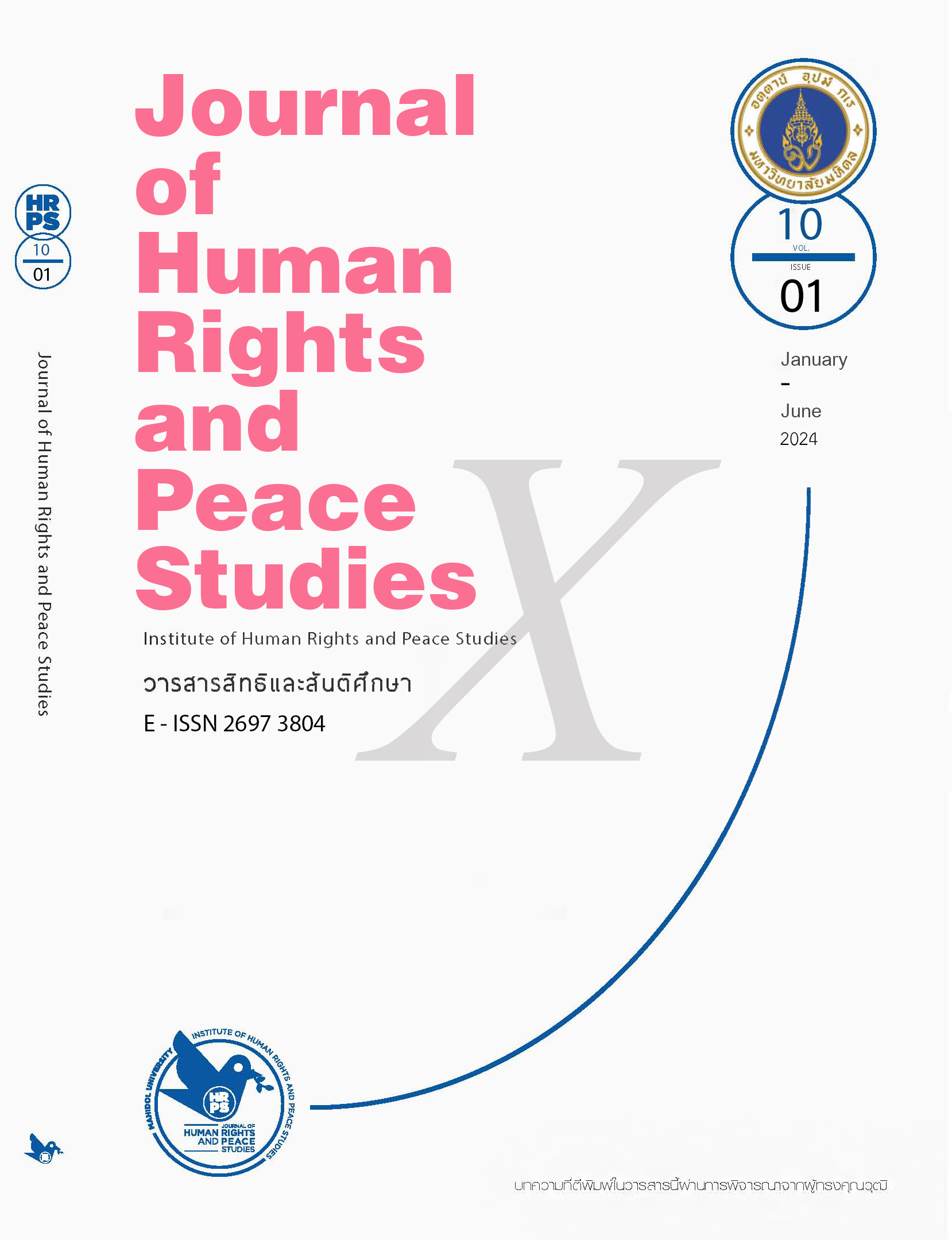Academic views on Peace Talk Promotion in the Southern Border Provinces
Main Article Content
Abstract
This research article aims to understand the views of academics in support of peace talks in the Southern border provinces through in-depth interviews and field notes from 9 Thai researchers on the conflict and its resolution. This research, conducted from 1 May to 30 September 2020 involved 4 outsiders in, 2 insiders in, 2 insiders out, and 1 outsider out. A typology and taxonomy of the collected data, is followed by analysis, description, and explanation of the findings.Research Finding: an environment conducive for peace talks represents an initial step towards achieving peace. Experts advise 7 critical strategies for effective action, including attentive listening to all people's comments, cultivating a positive narrative through peace-oriented information, fostering unity across diverse faiths, conducting unbiased and sincere conflict resolution efforts, supporting civil society and ensuring freedom of peace-promoting spaces, refraining from undue interference with the Southern Border Provinces Administrative Centre, and avoiding stereotyping and unjust arrests. 7 ongoing strategies are: enhancing the quality of life for the populace, advancing the dualistic educational system, serving
Article Details

This work is licensed under a Creative Commons Attribution-NonCommercial-NoDerivatives 4.0 International License.
The views, opinions, and pictures expressed in this journal are those of the authors and do not necessarily reflect the opinions and viewpoints of the editor and the editorial board. All rights are reserved by the authors and the Institute of Human Rights and Peace Studies of Mahidol University. No part of this journal may be reproduced, stored in a retrieval system, or transmitted in any form or by any means without the prior permission in writing from the journal’s editor, or as expressly permitted by law, or under terms agreed with the appropriate reprographics rights organization. Non-commercial use of information in this journal must be properly referenced.
References
Bohm, D. (2003). On dialogue. Routledge Taylor and Francis.
Center for Conflict Studies and Cultural Diversity. (2023). The Peace Survey academic network offers 7 policy recommendations for building peace in the southern border. Institute for Peace Studies. https://cscd.psu.ac.th/th/node/532 (In Thai).
Chalermsripinyorat, R. (2013). Deconstructing the idea of the Patani independence movement. Deepbook. (In Thai).
Chalermsripinyorat, R. (2015). Path of the Patani peace process. Institute of Peace Studies, STEP II. (In Thai).
Deep South Watch. (2022). Southern Border/Patani 2004-2021: Entering the nineteenth year where will peace go in 2022? https://deepsouthwatch.org/th/node/12816. (In Thai).
Galtung, J. (2007). Transformation conflict resolution through peace. Khopfai Publisher. (In Thai).
Isranews Agency. (2014, August 7). Why change from “peace talk" to "happiness talk". https://www.isranews.org/content-page/item/31925-talk_31925.html. (In Thai).
Jitphiromsri, S. (2013). The concept of multipathism and multi-territoriality for the Patani peace process. In R. Panjor (Ed.), Patani peace process in the ASEAN context (pp. 52-67). Deepbook. (In Thai).
Jitphiromsri, S. (2020). Politics, governance and conflict management in the southern border provinces. Center for Conflict Studies and Cultural Diversity (CSCD), Institute for Peace Studies. (In Thai).
Kelsall, T. (2005). Truth, lies, ritual: Preliminary reflections on the truth and reconciliation commission in Sierra Leone. Human Right Quarterly, 27(2), 361-391.
Manager Online. (2020, February 29). There is still hope to put out the fires in the South! Survey results reveal that people in the area support the peace talks approach. https://mgronline.com/south/detail/9630000020648 (In Thai).
McCargo, D. (2013). Dialogue on self-government as a core substance in the southern border conflict. In R. Panjor (Ed.), Patani peace process in the ASEAN context (pp. 80-89). Deepbook. (In Thai).
McCargo, D. (2014). Tearing apart the land: Islam and legitimacy in Southern Thailand. Khopfai Publisher. (In Thai).
Office of the National Security Council. (2020). Southern border provinces administration and development policy 2017 - 2019. http://www.nsc.go.th/wp-content/uploads/2018/10/%E0%B899%E0%B8%A0%E0%B8%B2%E0%B8%84%E0%B9%83%E0%B8%95%E0%B9%89-%E0%B8%9E.%E0%B8%A8.-2560-2562.pdf (In Thai).
Patani Forum. (2012). Peace negotiations between Malay Muslims and the Thai state. Patani Forum. (In Thai).
Pathan, M. A. (2013). Dialogue on self-government as a core substance in the southern border conflict. In R. Panjor (Ed.), Patani peace process in the ASEAN context (pp. 6-9). Deepbook. (In Thai).
Peace Survey Network. (2019). 7 people's proposals for southern border policy/Patani Policy recommendations regarding the southern border provinces to political parties from the PEACE SURVEY network. https://peaceresourcecollaborative.org/wp-content/uploads/2019/11/peace_survey_recommendation_2019_th.pdf (In Thai).
Peace Survey Network. (2023). Documents announcing the results of the 7th survey of public opinion on the peace process in the southern border provinces. https://cscd.psu.ac.th/th/node/536 (In Thai).
Ropers, N. (2013). Lecture on IPP in the context of PPP central area creates peace from 'insiders' within the context of the Patani peace process. In R. Panjor (Ed.), Patani peace process in the ASEAN context (pp. 22-51). Deepbook. (In Thai).
Ropers, N. (2019). Peace with freedom. Prince of Songkhla University. https://peaceresourcecollaborative.org/wp-content/uploads/2020/05/IPP-29.pdf (In Thai).
Satha-Anand, C. (2016). Peaceful methods, the path to peace. The Thailand Research Fund. (In Thai).
Sirisawatwattana, S. (2023, July 25). Peace cannot come from the barrel of a gun: the dreams and hopes of southern border youth waiting to bloom. The 101 World. https://www.the101.world/voice-of-southern-youth/ (In Thai).
Srimuangkanchana, C. (2018). Progress in peace talks in southern border provinces. The secretariat of the House of Representatives. (In Thai).
Stephan, M., & Chenoweth, E. (2015). Why civil resistance works. Deepbook. (In Thai).
Thai PBS. (2020, March 4). NSC reveals "Thai Peace Discussion Group - BRN" in Malaysia holding constructive discussions. https://news.thaipbs.or.th/content/289528 (In Thai).
The Active Thai PBS. (2023, February 23). Southern border peace talks are fragile: How can they proceed?. https://theactive.net/read/peace-talk-dialogue/ (In Thai).
The Fifth Operations Coordination Center. (2020, January 24). Representatives of the Thai government firmly confirm that "Anas Abdalrahman-Abdul Aziz Jabal" is the real BRN. The Internal Security Operations Command. https://www.isoc5.net/trendings/view/24CF4683E61FD72643213A9B23AA506800000000000000000000000000000000/ (In Thai).
Working group to create a peace space from insiders. (2014). Peace media day documents: How does the peace process move forward. Prince of Songkhla University. (In Thai).


